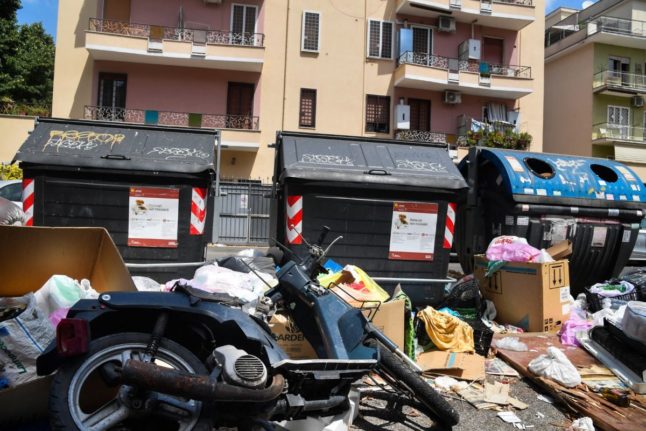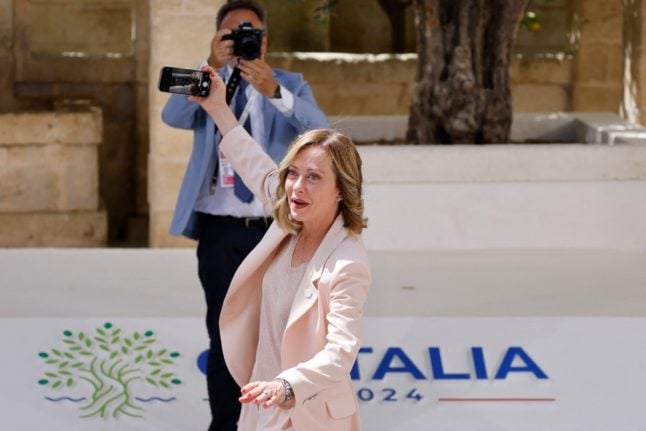It took her more than two weeks, but Italian Prime Minister Giorgia Meloni on Friday publicly condemned the racist comments made by members of her far-right party’s youth wing revealed in an undercover investigation that has been dominating Italian headlines.
In case you haven’t seen or heard about it yet, the video published this month by Italian news website Fanpage showed members of the National Youth, the junior wing of Brothers of Italy (FdI), engaging in fascist salutes, chanting the Nazi “Sieg Heil” greeting and shouting “Duce” in support of late Italian fascist dictator Benito Mussolini.
Meloni didn’t mention any of that on Friday, but she did address some of the comments youth members made on the video, saying that “racist, anti-Semitic or nostalgic ideas” were “incompatible” with her party.
While Meloni distances herself and her party from its neofascist roots and any associations with Mussolini’s regime, she has never denounced fascism entirely, and seems to shy away from using the word at all.
Still, she claimed that there was “no ambiguity” over the issue on her part – while also complaining that journalists should not be filming without permission.
After more revelations of racist and hateful comments by youth wing members came out of the investigation this week, it looks like this storm isn’t going to blow over as quickly as Meloni probably hoped.
Usually, news stories about Italian political figures displaying their admiration for fascism provoke less public outrage in Italy than you might expect. There has never been a palpable sense of widespread anger at, say, Brothers of Italy co-founder and Senate president Ignazio La Russa proudly collecting Mussolini statues.
Overall, attitudes to extreme political viewpoints in Italy tend to be permissive in a way that they’re not in, for example, Germany on the topic of Nazism.
But the latest story about the youth wing seems to have hit a nerve with the public in the way similar reports in the past haven’t. Perhaps because it seems so anomalous.
In my experience, when talking to younger Italians it’s clear that most today see such views as abhorrent, severely outdated, or just (as Italian kids say) “cringe”. Thankfully, those members of FdI’s youth wing seen in the video represent only an extreme minority.
Rome’s Jubilee makeover
In other news this week, could the Italian capital finally be cleaning up its act?
The city council has announced plans to install 18,000 new rubbish bins and 120 public toilets as part of a €3 million renovation project ahead of the Jubilee Year 2025.
This was welcome news for residents and regular visitors, most of whom have long since given up on trying to find public bathrooms in the city and rely on using the facilities at cafes and bars instead.
It also followed the recent announcement of thousands more taxi licences for the city, while major works are also ongoing to improve Rome’s notoriously unreliable public transport system in time for the Jubilee year, when millions more visitors than usual are set to descend.
“The city will face an extraordinary influx of tourists and pilgrims, who we will have to assist in their most immediate needs,” Rome mayor Roberto Gualtieri said as he announced the plans this week.
This does beg the question of how a major European capital city in 2024 can lack such basic public services, and why these problems are only now being tackled for the convenience of tourists after years (or, in some cases, decades) of complaints from long-suffering city residents.
So maybe it wasn’t surprising that many Romans greeted the announcement by drily pointing out that the city will also have to ensure all these toilets are cleaned, and the bins emptied and waste dealt with – something the local authority has long struggled to do efficiently, and which few residents can believe they’ll have sorted by 2025.
But we can at least hope that it’s a case of meglio tardi che mai (better late than never). The current local administration is showing the political will to start tackling these issues. And importantly, there’s the money to pay for it. Much of the major renovation work going on in the city right now is covered fully or in part by European post-Covid recovery funds – so it really is now or never.
If you’re still feeling sceptical, just watch this video of Gualtieri showing off one of his new bins: he seems genuinely thrilled with it.
Rome’s shiny new bins even have an official name: Cestò – which is a play on the word cesto (basket or bin) and the Roman dialect phrase ce stà, meaning ‘it’s in’ – and their own slightly cheesy slogan, which Gualtieri demonstrates for us here: “Io ce sto, e tu?” (I’m in, are you?)
Oggi abbiamo inaugurato Cestò, il nuovo cestino di Roma Capitale, uguale in tutta la città. Ne installeremo da qui a dicembre 18mila, triplicandone il numero attuale, dal centro alla periferia.
Sono cestini più belli, sostenibili e capienti. Provvederemo alla differenziazione a… pic.twitter.com/WXJcN1wqZA— Roberto Gualtieri (@gualtierieurope) June 25, 2024
Inside Italy is our weekly look at some of the news and talking points in Italy that you might not have heard about. It’s published each Saturday and members can receive it directly to their inbox, by going to their newsletter preferences or adding their email to the sign-up box in this article.



 Please whitelist us to continue reading.
Please whitelist us to continue reading.
Member comments